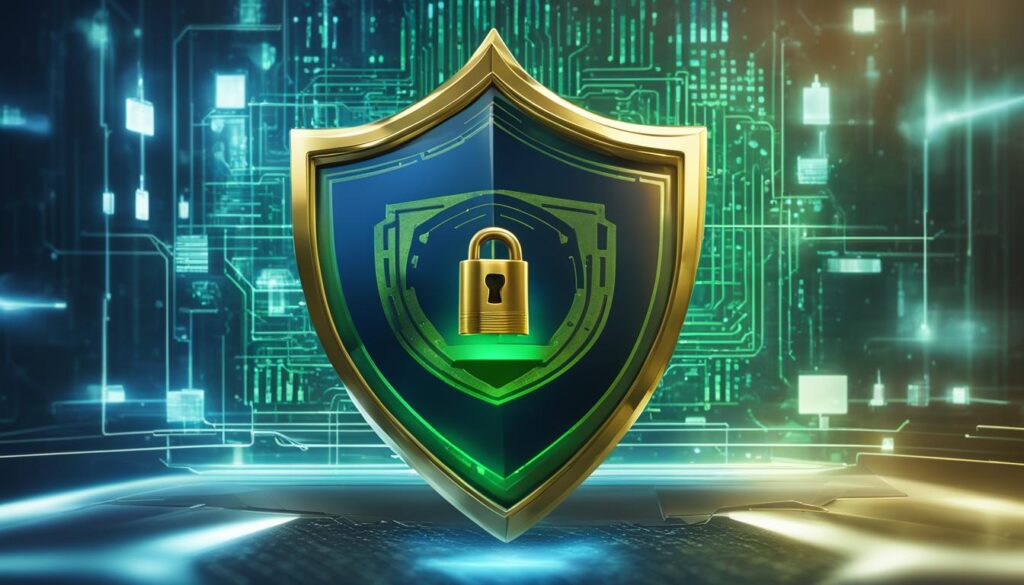In today’s digital age, managing finances online has become increasingly common. However, with this convenience comes the risk of cyber threats and potential data breaches. It is crucial for individuals and finance companies to prioritize cybersecurity measures to protect sensitive financial data. By implementing strategies such as secure transactions and data encryption, you can safeguard your online financial information from malicious actors.
Key Takeaways:
- Cybersecurity is vital for managing finances in the digital age.
- Secure transactions and data encryption are essential to protect your online financial data.
- Implementing robust cybersecurity measures helps minimize the risk of cyberattacks.
- Stay vigilant and educate yourself about potential threats in order to safeguard your financial information.
- By prioritizing cybersecurity, you can ensure the security of your online financial transactions.
The Importance of Cybersecurity for Finances Management
In today’s digital world, cybersecurity plays a crucial role in managing finances. With the increasing popularity of online banking and financial transactions, individuals and finance companies are faced with the constant threat of cybercrime. It is essential to prioritize cybersecurity measures to prevent fraud and protect sensitive financial information.
“Implementing measures such as fraud prevention techniques, secure transactions, and data encryption can help mitigate the risks of cyber threats and ensure the security of financial data.”
To safeguard online financial data, one of the key strategies is fraud prevention. This involves implementing robust security measures to detect and prevent unauthorized access to sensitive information. By utilizing secure transactions, such as encrypted connections and two-factor authentication, individuals can protect their financial transactions from interception and manipulation.
Data encryption is another critical component of cybersecurity for finances management. By encrypting financial data, it becomes unreadable to unauthorized parties, providing an additional layer of protection against cyber threats. Finance companies should prioritize the use of strong encryption algorithms to secure customer data, both during transit and at rest.
Secure transactions and data encryption are key components of cybersecurity for finances management.
By implementing these measures, individuals and finance companies can minimize the risk of cyberattacks and protect sensitive financial information. It is essential to stay proactive and up-to-date with the latest cybersecurity practices to ensure the continued security of online financial data.
Tips to Enhance Cybersecurity for Finances Management
When it comes to managing finances online, cybersecurity should be a top priority. By implementing the right strategies, individuals and finance companies can protect themselves from fraud and ensure the security of their financial data. Here are some tips to enhance cybersecurity for finances management:
- Keep software up to date: Regularly updating your operating system, web browsers, and antivirus software is essential to stay protected against the latest security vulnerabilities.
- Use strong and unique passwords: Create strong passwords that include a combination of uppercase and lowercase letters, numbers, and special characters. Avoid using the same password for multiple accounts.
- Enable two-factor authentication: Two-factor authentication adds an extra layer of security by requiring a second form of verification, such as a code sent to your smartphone, in addition to your password.
- Be cautious of phishing scams: Be wary of emails or messages that ask for personal or financial information. Avoid clicking on suspicious links and only provide sensitive information on secure websites.
- Protect your Wi-Fi network: Secure your home Wi-Fi network with a strong password and enable encryption. Avoid using public Wi-Fi networks for financial transactions.
- Regularly monitor your accounts: Keep a close eye on your bank and credit card statements for any unauthorized transactions. Report any suspicious activity to your financial institution immediately.
By following these tips, individuals and finance companies can significantly reduce the risk of fraud and enhance cybersecurity for finances management. Remember, staying vigilant and proactive is key to protecting sensitive financial data in the digital age.

Additional Resources:
Here are some additional resources that can help you further enhance cybersecurity for finances management:
- US-CERT Security Tips
- FTC Online Security Resources
- FDIC Consumer Privacy and Information Security
Table: Comparison of Data Encryption Methods
| Symmetric Encryption | Asymmetric Encryption | |
|---|---|---|
| Definition | Uses a single key for both encryption and decryption | Uses a pair of keys – one for encryption and another for decryption |
| Security | Strong against brute-force attacks, but key distribution can be a challenge | Highly secure due to the use of two keys, but slower than symmetric encryption |
| Key Length | Shorter key length | Longer key length |
| Applications | File and disk encryption, secure communication channels | Secure email communication, SSL/TLS encryption |
The Benefits and Risks of Digital Banking
Online banking and mobile banking have revolutionized the way we manage our finances. With just a few clicks or taps, we can pay bills, transfer money, and deposit checks from the comfort of our own homes or while on the go. The convenience and accessibility of digital banking have made it increasingly popular among individuals and businesses alike. However, it’s important to be aware of the benefits as well as the risks associated with digital banking.
The Benefits of Digital Banking:
- Convenience: Digital banking eliminates the need to visit a physical bank branch, saving you time and effort.
- 24/7 Access: You can access your accounts and carry out financial transactions anytime, anywhere, as long as you have an internet connection.
- Cost Savings: Digital banking often comes with lower fees and charges compared to traditional banking methods.
- Efficient Money Management: With online banking, you can easily track your expenses, set up automatic bill payments, and receive real-time updates on your account balance.
- Environmentally Friendly: By reducing the need for paper statements and physical transactions, digital banking helps to minimize paper waste and carbon footprint.
The Risks of Digital Banking:
- Data Security: While financial institutions employ robust security measures, there is still a risk of data breaches and unauthorized access to your personal and financial information. It’s crucial to choose strong and unique passwords, enable two-factor authentication, and regularly update your devices and banking apps to mitigate these risks.
- Phishing Scams: Cybercriminals may attempt to trick you into revealing sensitive information through phishing scams. Be cautious of emails, messages, or phone calls asking for your banking credentials or personal details, and never click on suspicious links or download attachments from unknown sources.
- Public Wi-Fi Risks: Public Wi-Fi networks are often unsecured, making it easier for hackers to intercept your online activities. Avoid conducting sensitive financial transactions or accessing your bank accounts when connected to public Wi-Fi.
- Malware and Viruses: Your devices may be vulnerable to malware and viruses that can compromise your online banking security. Install reliable antivirus software and regularly scan your devices to detect and remove any potential threats.

It is important to understand the benefits and risks of digital banking to make informed decisions regarding your finances. By taking proactive steps to protect your data and staying vigilant against potential threats, you can enjoy the convenience and efficiency of digital banking while minimizing the associated risks.
Conclusion
Cybersecurity is paramount when it comes to managing your finances in today’s digital landscape. The increasing frequency of data breaches and cyber threats necessitates a proactive approach in safeguarding your online financial data. By implementing robust cybersecurity measures, such as fraud prevention techniques, secure transactions, and data encryption, individuals can protect their sensitive financial information and minimize the risk of cyberattacks.
Staying vigilant is key. Education is crucial in understanding potential threats and how to combat them effectively. It is essential to prioritize data breach prevention and take proactive steps to secure your financial transactions. By choosing strong and unique passwords, enabling two-factor authentication, and avoiding public Wi-Fi for sensitive transactions, you can significantly reduce the risk of unauthorized access to your financial accounts.
Additionally, signing up for banking alerts and being cautious of phishing scams can further enhance your cybersecurity. It is important to be discerning when it comes to financial apps, ensuring that you only choose reputable and trustworthy options. By following these guidelines, you can confidently navigate the world of online and mobile banking while ensuring the security of your financial information.
In conclusion, protecting your online financial data is a shared responsibility between individuals and finance companies. By prioritizing cybersecurity measures and implementing best practices, such as fraud prevention techniques, secure transactions, and data encryption, you can maintain the security of your finances and mitigate the risks of cyber threats. Stay proactive, stay informed, and stay secure.
FAQ
Why is cybersecurity important for managing finances?
Cybersecurity is crucial for managing finances in today’s digital world. With the rise of online banking and financial transactions, individuals and finance companies must take proactive steps to prevent fraud and protect sensitive financial information.
What measures can individuals and finance companies implement to enhance cybersecurity for finances management?
Individuals and finance companies can implement measures such as fraud prevention techniques, secure transactions, and data encryption to mitigate the risks of cyber threats and ensure the security of financial data.
What are some tips to enhance cybersecurity for finances management?
To enhance cybersecurity for finances management, individuals and finance companies can follow tips such as choosing strong and unique passwords, enabling two-factor authentication, avoiding public Wi-Fi, signing up for banking alerts, being cautious of phishing scams, and choosing trustworthy financial apps.
Why is data security important in digital banking?
Data security is important in digital banking because it helps protect online financial data from cyber threats and fraud. With the increasing frequency of data breaches and cyberattacks, it is crucial for individuals to prioritize the security of their online financial data.
How can individuals protect their online financial data?
Individuals can protect their online financial data by implementing robust cybersecurity measures such as fraud prevention techniques, secure transactions, and data encryption. Staying vigilant, educating themselves about potential threats, and taking proactive steps are also essential.
How Can Cyber Finance Shield Protect My Financial Data When Using Money Management Apps?
When it comes to mastering money management apps, protecting your financial data is crucial. Cyber Finance Shield offers robust security measures to keep your sensitive information safe while using these apps. With advanced encryption and real-time monitoring, you can trust Cyber Finance Shield to safeguard your financial data from potential threats.